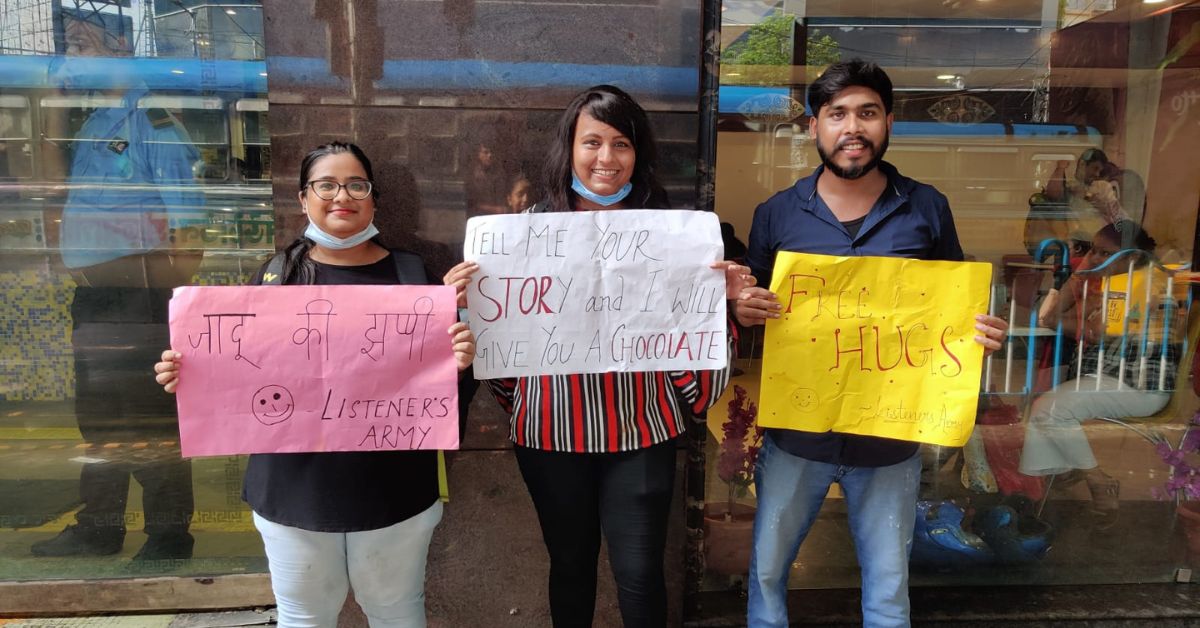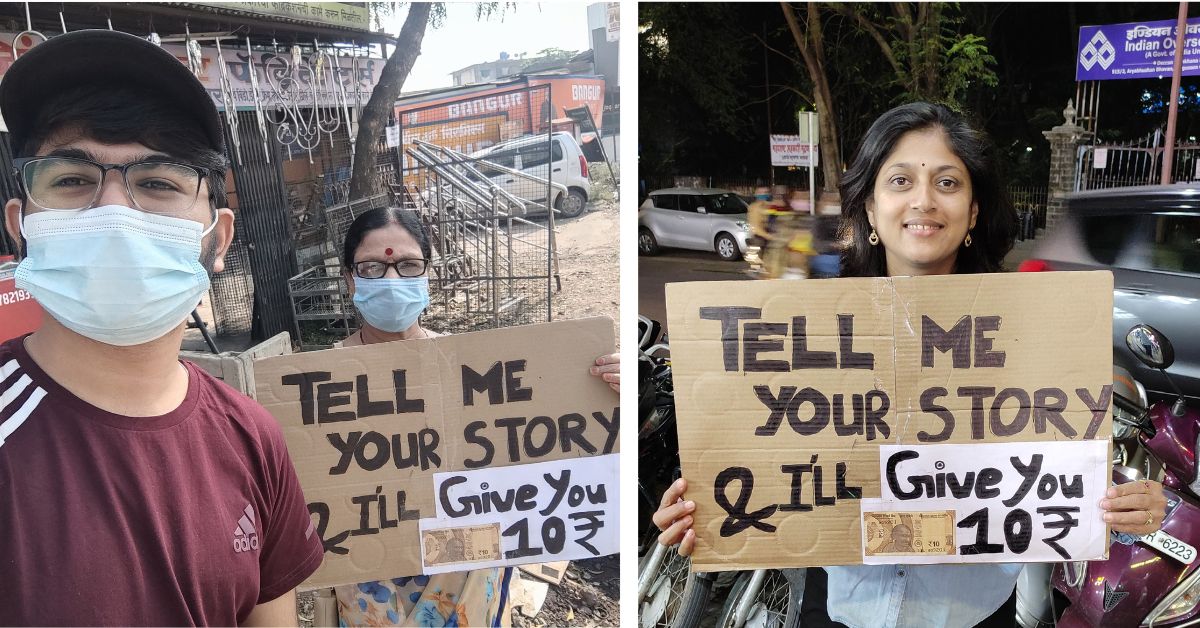Trigger warning: This story contains mentions of suicide, depression and self-harm.
In a bright room, 20-year-old Raj Dagwar met his college therapist, a stranger who would alter his life forever. After silently enduring his suffering for almost seven months, Raj finally felt a sense of relief, as if he could breathe freely again.
“I spoke continuously for two hours without skipping a beat. That day, I realised how important it is to just talk…and the strength that lies in the power of listening,” he recalls in a conversation with The Better India.
Now 25, Raj Dagwar is the founder of Listener’s Army, a non-profit organisation helping people deal with mental health issues.
“We do what our name suggests — we listen. Our generation has been the most isolated and the best thing one can do is listen. If a person needs professional help, we refer them to our psychologists too,” says Raj.
‘A dark pit that can swallow you whole’
Born and raised in a happy family, Raj moved to Pune for his engineering course.
“It was when I was in Pune when things started to go downhill. I was in a relationship with a person and it did not work out. I was not doing good at college either. Suddenly, life felt hard and I felt alone in all of it,” he recalls adding that he felt helpless.

“I could not see any purpose to my life and everything seemed bleak. I would lock myself in my room and not come out for days,” he says.
“This adversely affected my attendance and academic performance. I did not eat for days and felt like I was in a bottomless pit of darkness. In big cities, my generation faces a haunting isolation amidst the rush towards goals. When going through struggles, it’s easy to be consumed by this loneliness,” he adds.
Suffering silently, Raj could not communicate with either his friends or family about how he was feeling.
“When you start feeling depressed, it becomes very scary. It was very hard for me to talk about what I was feeling. When I did speak to my parents, they were not able to understand it. They would say ‘sir dard hai to dawai lele’ (if you have a headache, take medicine). It was very hard for them to understand that depression is different from physical illnesses,” he shares.
Having failed to get support from his parents, Raj says he became even more closed off. “I started to keep to myself and my head would keep buzzing with thoughts of ending my life. I would always look at it as a relief from this silent suffering. Soon enough, thoughts of harming myself and suicide became stronger,” he says.
It was a professor in his college who noticed Raj’s behaviour and advised him to see the campus therapist. “At that time, seeing a therapist was like a leap of faith for me as I had made up my mind that there was no end to the suffering. In that two-hour long session, I just vented out.”
“My therapist was a great listener and he helped me realise that I have to talk through my issues,” he says. So Raj continued to visit the therapist to fight depression. He adds, “Fighting depression is not a linear journey; it is not like you are in and then out of it. It is a combination of relapses.”
‘There is light at the end of the tunnel’
“When the pandemic hit, I was still in therapy and was trying my best to keep myself healthy. But at the same time, I also wanted to do something to help people like me, but I was not sure how,” he says.
It was around this time when Raj found a video on the internet. “There was a man who was paying a small amount of money to people to tell their stories. I decided to replicate the same in India,” he says.
So when the world opened its doors again and Raj was back at his college, he decided to stand outside his college with a sign that read — “Tell me your story and I will give you Rs 10.”
“This attracted a lot of people, some out of curiosity and some out of their sheer need to talk. I also started to post about my initiative online on Instagram. Within a few days, I was flooded with DMs [direct messages] and requests from both people who wanted to talk and people who wanted to listen,” he says.
The overwhelming response made Raj realise that his initiative could be converted into a forum of listeners. “This is how the Listener’s Army started. Today our non-profit is around 600 listeners strong who are all volunteers,” he says.
The volunteers or listeners and the people who want to tell their stories are from all over the country like Bengaluru, Mumbai, Pune, Jaipur, etc.
Lending a compassionate ear to people
Explaining how a person can become a listener, Raj says, “The stories and incidents that people share can be quite taxing and overwhelming. This is why every person who wants to become a listener has to undergo a small evaluation, conducted by psychologists and therapists who collaborate with us. Once the volunteers are cleared by the therapist, we let them in our army,” he explains.

Earlier it was just something that I did, he says, but now it feels like a movement.
“Sessions are held absolutely free of cost in both online and offline formats. Anyone can come and tell us their story, and we simply listen. If the listener feels that the person needs professional help, they refer them to our therapists or psychologists in government facilities,” he says.
Ateesh Anna, a writer and volunteer for Listener’s Army says, “I found out about the initiative through Instagram and was very intrigued. I wanted to be part of such an amazing movement. I have been volunteering with them from Raipur for the past one and a half years.”
Sharing one of his favourite incidents as a listener, he says, “There was an old woman who saw my sign and walked up to me. She said, ‘I have so many stories, you will need all day’. I readily said, ‘Come, let us sit’. She spoke to me for 48 minutes and told me how lonely she feels at home, now that her kids are all settled far away. She told me that talking to me felt like she was talking to her son.”
He continues, “It made my day! Isolation among seniors is a topic that is rarely discussed. They mostly suffer alone and I was so happy that I could be her friend that day.”
Over the last three years, Raj has lost count of the number of stories he’s heard. “One common thread runs through all of them — isolation,” he reflects. “I tell them that even I once believed that there was no end to feeling depressed. But with the right support system, you can overcome it.”
The group posts about their work on Instagram where they get the most number of volunteers and people seeking help. So far, they have amassed over 18,000 followers on Instagram, informs Raj.
Looking back, he says, “To anyone who is suffering like I once did, all I can say is ‘open up’. The worst thing I did to myself was bottle it all in. Talk to your parents, they are your best friends. Talk to us and find the right set of people to help you through this.”
If you wish to volunteer with the group or want to tell your story, you can find them here.
(For anyone struggling with thoughts of suicide or self-harm, here’s a site which has a list of helplines.)
Edited by Pranita Bhat
No comments:
Post a Comment